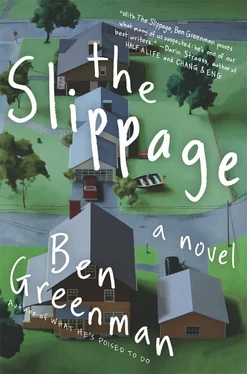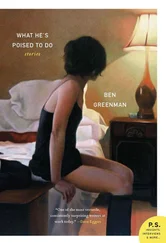William was going through the neighborhood with her, late at night, on a walk no one needed but him. It was cold and cheerless and he walked quickly, toward the open mouth of the cul-de-sac. He passed the Kenners’, saw the blue glow of a computer screen. He passed the Morgans’, smelled something baking. He passed the Zorillas’, heard the faint sound of a woman either crying or moaning, but flattened, like it was coming from a television. At the end of the street, he took Blondie left and came back up the parallel street. He stopped in front of Annie Martin’s house, which backed Emma and Stevie’s. It was dead quiet, which meant that Annie Martin was awake; when she slept, she ran the radio loud so that people would think there was life in the house. He passed through her yard to the border of Emma and Stevie’s lawn, where he looped Blondie’s leash around the low half branch of an oak. He whispered the dog’s name. He went farther into Emma’s yard until he could see her bedroom window.
Emma came into the frame in her underwear, brushing her hair. She wore a white T-shirt but then she took it off. Her breasts hung heavy, and her belly was emphatic beneath them. She traced down the middle of her stomach with her index finger and he remembered doing the same. She turned away from him, toward the mirror, and he felt the nearness of her body through the window, through the wall. Then a noise spooked him, a rustling in the bushes, and he crab-walked toward the right side of the house, where he encountered another noise. It was Stevie’s guitar playing, coming from the rearmost window of the garage. He was playing a series of notes, slowly, tidally. Each note had a shape, most round, some jagged, and yet they all seemed to fit together. It was beautiful until Stevie began to sing, and then it was something else. William shifted his weight forward, and just at that moment a cat scampered across his path, flashing eye-shine up at him. Blondie chuffed and rolled a bark in the bottom of her throat, and William untied her and hurried along the strip of lawn to the street.
The next day, he saw her again. He had stocked up for the party — rum and vodka, plastic cups and paper napkins, chips, dip, peanuts both plain and flavored, olives as big as eggs — and the young cashier had remarked upon the purchase, and he had said that it was all for him, and the girl had laughed, a bell in the afternoon.
At home, he unloaded the bags into the garage and leashed up Blondie for a walk. “You look awfully familiar,” he said. “Do I know you from somewhere?”
A shadow overtook him at the head of the street, just outside the Roth house, which had a paper scarecrow hanging in the great window that overlooked the front lawn. It was Emma. “You weren’t going to invite me?” She tried to sound indifferent, but she was out of breath from coming up the block. It was warm and humid, and half circles of sweat darkened her green blouse under the arms. Her hair was matted to the sides of her head. It occurred to him, for one crazy moment, to tell her that he’d liked it better through the window the night before.
“To what?”
“This party at your new house. I didn’t get an invitation.” They went under a shade tree that was either dead or close to it; Blondie circled the trunk as far as her leash allowed. “Look,” Emma said before he could talk. “Maybe I shouldn’t say anything. But Stevie asked me and I don’t have a good answer.”
“What about the truth?”
“Hilarious. He’s under the impression that all of us are friends. He talks to Louisa some evenings, driveway to driveway, just the kind of neighborhood chitchat that normal people do.”
“How do you know you’d even be able to come?” He indicated her belly. “You won’t want to bring a baby to a boring party.”
“Why not?” she said. “Just make it right.”
“And if I invite you, that will be right?”
“Sure,” she said. “Neighbors at parties of neighbors. Normal.”
“Okay,” he said. “Especially since the occasion is that we won’t be neighbors for long. I lived here for ten years and you chased me out in four months.”
Her expression cracked a bit, and what came through was sadness mixed in with a little bit of triumph. “Don’t be mean,” she said.
“Not mean,” he said. “Just saying.”
“We might not be long for this place either,” she said. “Corporate creative has really taken a shine to Stevie.”
“Corporate creative? A shine?”
“The less said, the better,” Emma said.
“I’m not saying anything,” William said. “So that should be best.”
“Hey,” Emma said. “Look.” Higher up on the tree’s trunk, William could see the edge of a honeycomb protruding from a hollow. “They usually use bigger spaces than that,” Emma said. “They smooth the bark near the entrance. Can you see?” She angled her head up. The wind freshened and gusted behind them. A spot appeared at the corner of the hive and bombed down at Emma. “Ouch!” she said. She hit at her own hip. “Damn it.” What looked like a bee’s corpse tumbled to the ground.
“It’s exactly like your dream,” William said.
“Yeah,” she said. She frowned. “That’s what I think about my life every day. Just like a dream.”
William wasn’t up for more conversation. He tugged on Blondie’s leash and headed for home, counting twenty steps before he turned and looked back. He wasn’t sure what he expected to see, not exactly, but what he saw was a woman he had known for a few weeks, at most, staring up at a tree as sunlight dappled the grass beside her flatly.
He was deep into the invitation stage now. Fitch had said yes. Wallace had said yes. Tom had said no and laughed and asked if William minded if he set the phone down while he thought things through and then, without setting the phone down, said he couldn’t be sure because Jesse had reconsidered his offer, and then laughed again, with a hope that was also a fear that the hope was misplaced, and said that he couldn’t control the pace of that reconsideration and didn’t want to, because he wanted to fully deserve whatever came to him. “I’ll put you down as a maybe,” William said.
The phone rang back right after he hung up with Tom. “Hello?”
“Is this William?”
“It is,” he said, suddenly unsure.
“This is Bonnie Travis.” He couldn’t place the name at first, and then he remembered: the short, moon-faced woman who was married to Jim, Louisa’s ex-boyfriend. They lived in Seattle with a boy and a girl. She did something in sales. Bonnie.
“Hi,” he said. “How’s Jim?”
“That’s why I’m calling,” she said. “He’s dead.” Her voice, high and fluted, misshaped the word.
William caught his own reflection on the inside of the glass door that led out to the deck. It looked like a mirage. “What?” he said. It didn’t seem like enough. “How did…,” he said, and then stopped. Now it seemed like too much.
When Bonnie spoke again, her voice was frayed. “He’s been having a hard time. It started as money trouble and it spread. We haven’t been getting on.”
“We heard from him about a month ago, when you two were in town visiting. We were going to have a drink.”
“No,” she said. William let the line fill with silence. “He never even made that trip. He just wasn’t able.”
“But he said he was here. He said that you weren’t feeling well and that’s why he couldn’t come out to meet us.”
“He said lots of things, for lots of reasons.” She coughed a sob. “The funeral was small, just family.” It hadn’t occurred to William to think about the funeral until then. “I just thought you should know,” she said.
Читать дальше












